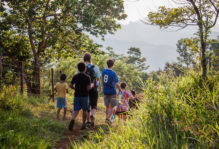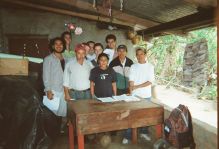Dominican Republic, Nicaragua, and the Eastern Shore
Our work in community health and health care for marginalized groups continues full speed. In the Dominican Republic and in Nicaragua, SOMOS and MANOS establish and operate annual medical clinics with medical providers and free prescription and non-prescription medications. We proceed through systematic research to efforts to understand the communities and find ways to partner with them to promote sustainable strategies for improving health and health care. The “model” we use prescribes data collection systematic to map and describe the community as the beginning point. We do that through systematic observation, ethnographic interviews, and the use of GPS technology. Next, we begin to “map” social networks, focusing progressively on differing dimensions of community relationships. We use Social Networks Analysis, grounded in matrix algebra, to capture and analyze these complex data.
SOMOS has now completed five years of work in Paraiso, Dominican Republic. MANOS has done four years in Cuje, Nicaragua. The progress has been slow but noteworthy. We’ve been able to support summer research students in both communities virtually every year since we began. Last summer, eight MANOS students conducted research in Cuje, while a SOMOS and a MANOS student did research in Paraiso. The accumulating data and our on-the-ground experience is beginning to provide the knowledge needed to “partner” in meaningful ways.
Last summer, a SOMOS/MANOS cabal undertook new work, on this side of waters. Two students from each project joined me in a grant-supported project to advance understanding of the health and health care issues of Spanish-speaking migrant farm workers on the Eastern Shore. Working with administrative and professional staff members of the Eastern Shore Rural Health System (ESRHS), we developed an interview instrument and conducted research in the migrant farm camps, trailer parks, and other residential areas on the Eastern Shore. While the work is similar to what we do in Nicaragua and the Dominican Republic, it is different in that we focused exclusively on data collection, we partnered with a local medical and health agency, and we worked within the United States. A draft of our research report is under review by the ESRHS staff professionals who worked most closely with the team. We expect to present the findings more formally in the near future.
We have begun to explore ways to partner with the Lackey Free Clinic in Yorktown, and a small project is underway to examine the health and health care status of chronically ill patients.
While I’m on leave, I hope to be able to write more regularly — both for the blog and for much needed reporting on the projects and their results. I hope you’ll stay tuned.



No comments.
Comments are currently closed. Comments are closed on all posts older than one year, and for those in our archive.